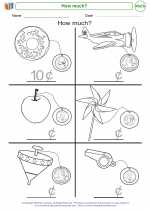Days
In Kindergarten Math, children learn about the concept of days. A day is a unit of time that consists of 24 hours. Understanding days helps children develop a sense of time and learn about the cycle of days, nights, and weeks.
Key Concepts
- Day and Night: Children learn that a day starts with the morning, followed by the afternoon, evening, and night. They understand that the sun is up during the day and sets at night.
- Days of the Week: Kindergarteners are introduced to the concept of days of the week - Sunday, Monday, Tuesday, Wednesday, Thursday, Friday, and Saturday. They learn to recognize and sequence these days.
- Activities and Events: Children learn to associate specific activities and events with different days of the week. For example, they may learn that they have school on weekdays and have the weekend off for play and relaxation.
Learning Activities
Teachers and parents can engage children in various learning activities to reinforce the concept of days:
- Calendar Time: Children can participate in daily calendar activities to learn about the days of the week, months, and dates. They can practice identifying and naming the different days on the calendar.
- Sequencing: Children can engage in sequencing activities to arrange the days of the week in the correct order. This helps them understand the concept of a weekly cycle.
- Storytelling: Reading stories about daily routines and activities can help children relate the concept of days to real-life experiences.
Assessment
Assessment of children's understanding of days can be done through activities such as:
- Identifying Days: Children can be asked to point to and name specific days on a calendar or in written form.
- Sequencing Tasks: Children can be given tasks to arrange the days of the week in the correct sequence to demonstrate their understanding of the weekly cycle.
- Recalling Activities: Children can be encouraged to share what activities they do on different days of the week to assess their understanding of associating events with specific days.
By understanding the concept of days, children develop a foundational understanding of time and the organization of daily life events, setting the stage for more advanced learning in the future.
[Days] Related Worksheets and Study Guides:
.◂Math Worksheets and Study Guides Kindergarten. How much?
The resources above cover the following skills:
Measurement and Data
Work with time and money.
Identify coins by name.


